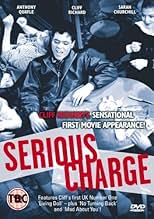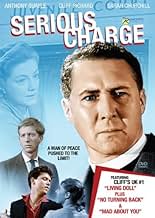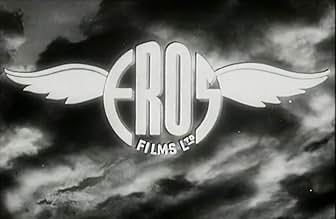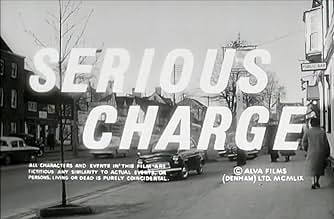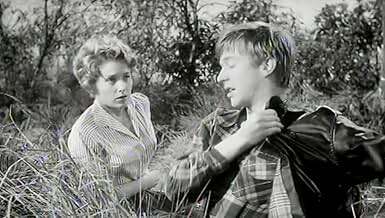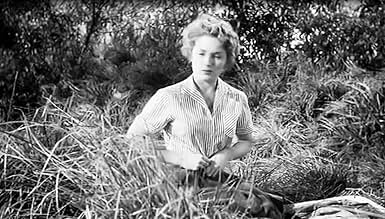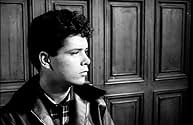Aggiungi una trama nella tua linguaA vicar falsely accused of assaulting a youth attempts to prove his innocence and save his reputation.A vicar falsely accused of assaulting a youth attempts to prove his innocence and save his reputation.A vicar falsely accused of assaulting a youth attempts to prove his innocence and save his reputation.
- Regia
- Sceneggiatura
- Star
Jess Conrad
- Dancer
- (non citato nei titoli originali)
Marie Devereux
- Sexy Girl in Coffee Bar
- (non citato nei titoli originali)
Carol Dourof
- Dancer
- (non citato nei titoli originali)
Recensioni in evidenza
Intriguing British drama about a priest, underplayed brilliantly by Anthony Quale, who also is a bit of a local football hero, tries to bring redemption to the local teddy boys, this being 1959, and appears to avoid women like the plague, the implication being, is he gay or not? It all comes to a head when the main thug, played by Andrew Ray, gets a girl pregnant, and after a tragic accident, is confronted by Quale who is then falsely accused of 'interferring' with Ray, a quaint 1950's way of saying he molested him. Sarah Churchill, who is perhaps a bit old for her role, she was in her mid 40's at the time, holds the key to his innocence in the matter and eventually it all plays out but we are left wondering still, was he supposed to be gay or not? I don't think we were meant to really know as it was 1959 and mainstream films only ever dropped hints back then. At one point, Percy Herbert, playing Andrew Ray's violent father says, ' We haven't got one of them in the parish have we?'. Apparently back then, it was alright to beat the hell out of your son with a strap, backed up by the local copper, but not to be gay, clearly a despicable state of being then. Nevertheless, very interesting to compare how things have changed, and I do remember when people thought like this, but best of all, a wonderful performance by Anthony Quale who hold the film together with some otherwise dodgy performances, like Cliff Richard's first acting role.
For about the first hour this low-budget movie had definite aspirations of being added to the pantheon of significant films of the British New Wave, otherwise known as "kitchen-sink" dramas. Unfortunately it tails off tamely in the final half-hour as it retreats from the boldness of its narrative as just desserts are meted out and worse, love looks like it might conquer all.
Notable for being an early outing for later Bond director Terence Young as well as the feature debut for veteran British pop star, Cliff Richard, its plot is heavily derived from Arthur Miller's "The Crucible" as a respectable pillar of a small town community is accused of a scandalising, career-threatening crime by a grudge-bearing teenager, indeed, it's no surprise to learn that the film is itself an adaptation of a recent play. While there's no sub-text here of the Hollywood witch-hunt, the film does at least commendably approach the taboo subjects of pre-marital sex and homosexuality, remembering in particular that there was no Pill and that the latter was still a criminal offence in the U. K. until 1967.
The venerable Anthony Quayle plays a venerable parish priest looking in particular to have some positive interaction with the local youths. Of course being the 50's, some of these include the English version of the world phenomenon of teenage delinquency, who openly rebel against their elders, usually carrying concealed weapons like knuckle-dusters and chains and with a penchant for rock and roll music. Leader of this particular band is the tearaway Larry Thompson, played by Andrew Ray, who in addition to the above, has also abandoned a young girl he's got pregnant. He has a kid brother halfway to following him into minor crime, played by the debuting Cliff, who Quayle tries to rescue and a violent, brutish father who you wouldn't want turning up at your door with a grievance late at night. Lucky then that Quayle also trains the kids at boxing.
At the vicarage, passions are overheating, firstly in the form of the vicar's new, pretty young French maid who gets herself involved with Larry but secondly and more significantly with Sarah Churchill's man-hunting Hester, another vicar's respectable daughter, who makes a bee-line for Quayle. Hell hath no fury as we all know and when she's spurned by Quayle, she finds a way to revenge herself on him by supporting a false claim of molestation brought against the vicar by Larry, this after the poor pregnant girl has been accidentally knocked down and killed after she sees him making out with the maid in a bus-shelter and Quayle has summoned Larry to the vicarage to confront him about his treatment of the dead girl.
So far so good as the film confronts its contentious subject of alleged homosexuality with refreshing candour as the town turns against the heretofore admired vicar who now faces the ruination of his career. Unfortunately just as events edge towards a dramatic peak, the film draws back with a Damascene conversion, a ludicrously staged exposé scene and even worse, a final reconciliation with a romantic undertone which undoes much of the realism which has gone before.
Never mind, possibly the narrative was necessarily bowing to the censorship laws of the time, it's just a pity that having put its head above the parapet towards modernity, it felt it had to withdraw it again for a diluted happy ending.
Quayle is very good as the conscientious preacher, likewise Ray and Churchill in slightly more cliched roles. Cliff doesn't get to do much other than look pretty and sing a rocking version of his hit ballad "Living Doll". There's strong support from recognisably stalwart British character actors, the best of whom I thought was Irene Browne as Quayle's supportive and perceptive mother.
While the film is a little dated by its treatment of its hep-catting rock and roll juveniles, and ultimately cops out from fully confronting societal attitudes of the time, it at least openly raises the subjects of teenage pregnancy and homosexual behaviour and still feels like a further step along the road to challenging the norms of the day and is to be commended for that.
Notable for being an early outing for later Bond director Terence Young as well as the feature debut for veteran British pop star, Cliff Richard, its plot is heavily derived from Arthur Miller's "The Crucible" as a respectable pillar of a small town community is accused of a scandalising, career-threatening crime by a grudge-bearing teenager, indeed, it's no surprise to learn that the film is itself an adaptation of a recent play. While there's no sub-text here of the Hollywood witch-hunt, the film does at least commendably approach the taboo subjects of pre-marital sex and homosexuality, remembering in particular that there was no Pill and that the latter was still a criminal offence in the U. K. until 1967.
The venerable Anthony Quayle plays a venerable parish priest looking in particular to have some positive interaction with the local youths. Of course being the 50's, some of these include the English version of the world phenomenon of teenage delinquency, who openly rebel against their elders, usually carrying concealed weapons like knuckle-dusters and chains and with a penchant for rock and roll music. Leader of this particular band is the tearaway Larry Thompson, played by Andrew Ray, who in addition to the above, has also abandoned a young girl he's got pregnant. He has a kid brother halfway to following him into minor crime, played by the debuting Cliff, who Quayle tries to rescue and a violent, brutish father who you wouldn't want turning up at your door with a grievance late at night. Lucky then that Quayle also trains the kids at boxing.
At the vicarage, passions are overheating, firstly in the form of the vicar's new, pretty young French maid who gets herself involved with Larry but secondly and more significantly with Sarah Churchill's man-hunting Hester, another vicar's respectable daughter, who makes a bee-line for Quayle. Hell hath no fury as we all know and when she's spurned by Quayle, she finds a way to revenge herself on him by supporting a false claim of molestation brought against the vicar by Larry, this after the poor pregnant girl has been accidentally knocked down and killed after she sees him making out with the maid in a bus-shelter and Quayle has summoned Larry to the vicarage to confront him about his treatment of the dead girl.
So far so good as the film confronts its contentious subject of alleged homosexuality with refreshing candour as the town turns against the heretofore admired vicar who now faces the ruination of his career. Unfortunately just as events edge towards a dramatic peak, the film draws back with a Damascene conversion, a ludicrously staged exposé scene and even worse, a final reconciliation with a romantic undertone which undoes much of the realism which has gone before.
Never mind, possibly the narrative was necessarily bowing to the censorship laws of the time, it's just a pity that having put its head above the parapet towards modernity, it felt it had to withdraw it again for a diluted happy ending.
Quayle is very good as the conscientious preacher, likewise Ray and Churchill in slightly more cliched roles. Cliff doesn't get to do much other than look pretty and sing a rocking version of his hit ballad "Living Doll". There's strong support from recognisably stalwart British character actors, the best of whom I thought was Irene Browne as Quayle's supportive and perceptive mother.
While the film is a little dated by its treatment of its hep-catting rock and roll juveniles, and ultimately cops out from fully confronting societal attitudes of the time, it at least openly raises the subjects of teenage pregnancy and homosexual behaviour and still feels like a further step along the road to challenging the norms of the day and is to be commended for that.
Very daring for its day (1959) "Serious Charge" may now look very much like a period piece yet this British movie about a vicar falsely accused of molesting a teenage boy still packs a punch thanks in large part to a fine script by Guy Elmes and Mickey Delamar and good performances from Anthony Quayle as the vicar, Andrew Ray as the boy who makes the allegation, Sarah Churchill as the woman who has the hots for Quayle and, perhaps best of all, Irene Browne as Quayle's no-nonsense mother. It was also the film that introduced a young Cliff Richard to the big screen as Ray's younger brother, (he sings "Livin' Doll"). Now Cliff and the teenage teraways are the films weakest links which in all other respects treats its subject seriously and with a surprising degree of intelligence. It's almost unimaginable that a similar film would have been made in America at this time.
I have only just seen this film on an obscure satellite channel. Way ahead of its time. It would not be out of place if it were remade today (without the awful version of "Livin' Doll"!) Does anyone know who played the youths in the film (apart from Cliff Richard and Andrew Ray) One looked like Nanette Newman and another like Bryan Forbes but they are not mentioned on this site. If it is them perhaps this film is where they met and fell in love.
One thing that struck me as I watched the film is that 46 years on nothing has changed, at least not for the better. A sad indictment on our society.
One thing that struck me as I watched the film is that 46 years on nothing has changed, at least not for the better. A sad indictment on our society.
Please don't read any re views with spoilers. The first hour of this film is pretty dull. The second half is something else and worth every minute.
A decent vicar has to contend with a group of bratty teens and an "old maid" who acts like he is the last gas station before the desert and is determined to land him as a husband. One wouldn't think these two situations would converge and get an innocent caring clergyman into serious trouble, but it did. It is rather shocking in fact.
Cliff Richard has a small role in this, but after all his surgeries it is difficult to be sure which character he plays. Also on hand is a busty, flash in the pan French teen actress.
Enjoy watching this poor dolt get out of this pickle!
A decent vicar has to contend with a group of bratty teens and an "old maid" who acts like he is the last gas station before the desert and is determined to land him as a husband. One wouldn't think these two situations would converge and get an innocent caring clergyman into serious trouble, but it did. It is rather shocking in fact.
Cliff Richard has a small role in this, but after all his surgeries it is difficult to be sure which character he plays. Also on hand is a busty, flash in the pan French teen actress.
Enjoy watching this poor dolt get out of this pickle!
Lo sapevi?
- QuizThe song, "Living Doll" by Cliff Richard and The Shadows (as The Drifters) was released as a single (in a different arrangement) as a spin off from this film. It was a British #1, and was the top-selling song of 1959.
- Citazioni
Mrs. Phillips: Now, do let's sit down, Hester. You're taking to another woman, not one of those helpless males who can't discuss anything important or private without staring out of a window or looking confused.
Hester Peters: I don't wish to be rude...
Mrs. Phillips: You can, my dear, because I'm going to be extremely rude to you.
- ConnessioniFeatured in A Bit of Scarlet (1997)
- Colonne sonoreLiving Doll
by Lionel Bart
Cliff Richard song
Accompanied by The Shadows (as The Drifters) (uncredited)
I più visti
Accedi per valutare e creare un elenco di titoli salvati per ottenere consigli personalizzati
Dettagli
- Tempo di esecuzione1 ora 27 minuti
- Colore
- Proporzioni
- 1.37 : 1
Contribuisci a questa pagina
Suggerisci una modifica o aggiungi i contenuti mancanti

Divario superiore
By what name was Serious Charge (1959) officially released in India in English?
Rispondi
